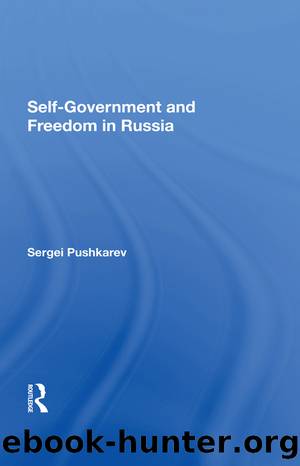Self-government And Freedom In Russia by Sergei Pushkarev

Author:Sergei Pushkarev [Pushkarev, Sergei]
Language: eng
Format: epub
Tags: History, General
ISBN: 9781000311228
Google: q02fDwAAQBAJ
Publisher: Routledge
Published: 2019-06-26T01:36:03+00:00
The Fourth State Duma
The autumn 1912 elections to the fourth convocation of the State Duma had the following results: sixty-five rightists were elected, eighty-eight nationalists, thirty-two from the âcenter,â ninety-eight Octobrists, forty-eight Progressives, fifteen Poles, six Moslims, fifty-eight Kadets, nine Laborites, fifteen Social Democrats and seven independents. Rightist and opposition parties had about 150 members, the centrists about 130. The Octobrist Mikhail Rodzianko, former chairman of the Third Duma, was elected chairman. The eyes and thoughts of the Duma and of society in 1912 and 1913 were focused on the Balkan Peninsula and on the war between allied Christian states and the Turkish Empire. In July and August, 1914 the Balkan crisis led to world war. The government of Austria-Hungary declared war on Serbia and began bombing Belgrade. The Russian government began mobilizing its armed forces, and on July 19, 1914 (old style calendar), Germany declared war on Russia.
The news of Germanyâs attack brought about an outburst of patriotism in Russia. The strikes that had gripped many Petersburg factories a short time before ended immediately. Thousands of demonstrators marched toward the Winter Palace, the crowds singing the national hymn. Only Lenin abroad and some Bolsheviks in Russia took a defeatist position.
The State Duma and the government showed themselves to be in complete unity at a festive session of the Duma on July 26. In fiery speeches representatives of all parties and nationalities, except for the Bolshevik âsix,â expressed their determination to defend the fatherland against the enemy attack. The Duma unanimously approved the governmentâs request for war credit (a few âdefeatistsâ did not participate in the vote).
The zemstvo and city self-governments assumed responsibility for helping the government provide medical services, food and uniforms, and meeting other needs of the army in the field. This led to the founding of Zemgor, which we mentioned earlier.
A critical situation developed on the front when the Germans, with a large concentration of forces, counterattacked in May 1915; by the end of the summer they had occupied Poland, Lithuania and Courland. This fact, along with a severe shortage of artillery and small arms ammunition in the Russian army, caused increasing dissatisfaction with the government, among the people and within the Duma.
About fifteen million reserves, militiamen and new recruits were called up, but because of a lack of weapons, the majority of recruits sat idle in the overcrowded barracks of the regiments that had left for the front. They had not even received military training since there was not only a lack of weapons but of officers as well. In addition, the masses of refugees who had evacuated territories abandoned by the Russians greatly complicated problems of supply and transportation.
In the summer of 1915 agitation and dissatisfaction reigned in the country. To calm the people the tsar dismissed some of the more unpopular ministers, including the war minister Sukhomlinov. To combat the âammunition hungerâ on the front in July 1915, Military-Industrial Committees were established. They succeeded in greatly increasing the production of military supplies, and in
Download
This site does not store any files on its server. We only index and link to content provided by other sites. Please contact the content providers to delete copyright contents if any and email us, we'll remove relevant links or contents immediately.
The European Opportunity by Felipe Fernández-Armesto(572)
The European History Highway: A Guide to Internet Resources by Dennis A. Trinkle Scott A. Merriman(543)
The Seven Wonders of the Ancient World by Michael Denis Higgins(529)
Morgan Kaufmann Digital Watermarking and Steganography by Ingemar Cox Matthew Miller Jeffrey Bloom Jessica Fridrich Ton(529)
Hyperculture by Byung-Chul Han(512)
European Security without the Soviet Union by Stuart Croft Phil Williams(511)
The Routledge companion to Christian ethics by D. Stephen Long Rebekah L. Miles(509)
European Security in a Global Context by Thierry Tardy(507)
Get Real with Storytime by Julie Dietzel-Glair & Marianne Crandall Follis(445)
Hudud Al-'Alam 'The Regions of the World' - a Persian Geography 372 A.H. (982 AD) by V. V. Minorsky & C. E. Bosworth(440)
Tibetan Studies in Comparative Perspective by Chih-yu Shih Yu-Wen Chen(437)
Gorbachev And His Generals by William C. Green(430)
Governance, Growth and Global Leadership by Espen Moe(428)
CliffsNotes on Fitzgerald's The Great Gatsby by Kate Maurer(414)
How Languages Are Learned 5th Edition by Patsy M Lightbown;Nina Spada; & Nina Spada(410)
The Egyptian Economy, 1952-2000 by Khalid Ikram(389)
The Oxford History of the World by Fernández-Armesto Felipe;(388)
Oral Poetry and Narratives from Central Arabia: The Poetry of Ad-Dindan : A Bedouin Bard in Southern Najd (Studies in Arabic Literature, Vol 17) (English and Arabic Edition) by P. M. Kupershoek P. Marcel Kurpershoek(368)
The Oxford Handbook of the Incas by Sonia Alconini(367)
